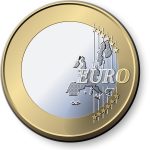EU Fast-Tracks Digital Euro with Ethereum and Solana Eyes
The European Union is speeding up its digital euro plans, considering public blockchains like Ethereum and Solana. U.S. stablecoin regulations and the increasing popularity of digital currencies worldwide are driving this urgency.
The Financial Times reported on August 22 that EU officials worry American regulations might boost the dollar’s hold in the $288 billion stablecoin market, primarily made up of USD-pegged tokens.This trend threatens the euro’s global standing and compels the EU to act swiftly.
The European Central Bank has long considered a digital euro—an electronic version of cash—eligible for transactions across the Eurozone. The shift reflects the growing appetite for digital payment methods and declining cash usage.
Piero Cipollone, a Central Bank executive board member, noted that while cash will stay accessible, it isn’t enough in today’s digital climate. A central bank-supported digital currency might keep public money convenient,complement cash,and ensure the euro’s relevance.
To quicken the digital euro’s launch, the ECB is evaluating public blockchains like Ethereum and Solana.These networks promise broader circulation and better global appeal compared to a private blockchain managed solely by the ECB.
Not all are enthusiastic, though. European banks have resisted, fearing threats to their established models. They foresee diminished interest in traditional financial services with digital euros in play.
No definite launch date exists yet. While the ECB floated October 2025, current circumstances may see the project expedited, pending legislative approvals and regulatory setups.



